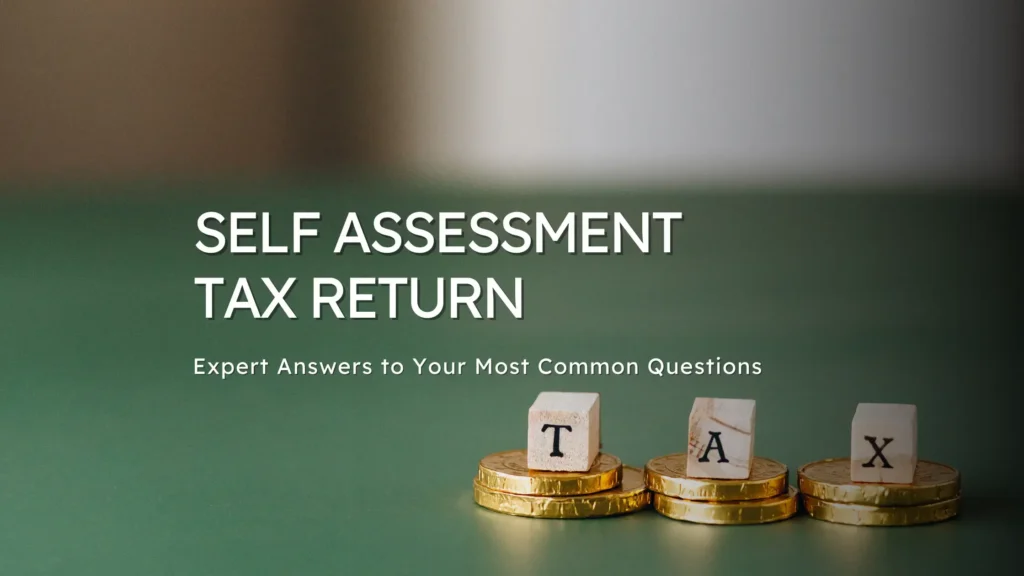It’s tax season again, and the self-assessment deadline is quickly approaching. It’s important to get everything in order to avoid any last-minute stress. In this blog, we’ve answered some of the most common questions about Self Assessment from key deadlines and filing methods to what to do if you make a mistake.
1. When is the deadline to file my Self Assessment tax return?
You’ll need to file your Self Assessment tax return by the deadlines set by HMRC, and the exact date depends on how you choose to file it.
- 31 October – for paper tax returns.
Paper returns take longer to process, so it’s best to submit them early to avoid delays. - 31 January – for online tax returns (the most common option).
Filing online is quicker, easier, and you’ll receive instant confirmation once your return is submitted.
For the 2024/25 tax year (6 April 2024 to 5 April 2025), the online filing deadline is 31 January 2026. Penalties start from £100 if you miss the deadline, even if you don’t owe tax. Interest also applies to any unpaid amount. To stay organised mark these dates in your calendar and file early.
2. How do I know if my Self Assessment has been successfully submitted?
Once you’ve submitted your Self Assessment tax return online, HMRC will let you know straight away if it’s been received. You’ll see a confirmation message on the screen along with a submission receipt number. It’s a good idea to save or screenshot this for your records. You’ll also get an email confirmation from HMRC (as long as you’ve provided a valid email address in your account). This is your official proof that your return has been successfully filed.
If you log back into your HMRC online account, you can also check the status of your tax return under your “Self Assessment” section. It will show the date you submitted it and whether HMRC has processed it. If you filed a paper tax return, you won’t get an instant confirmation, but HMRC will send you a letter once they’ve received and processed your form.
So, if you’ve got that confirmation message or email congratulations! Your Self Assessment has been safely submitted, and you can relax knowing it’s all taken care of. You can check the progress of your tax return or refund anytime by logging into your HMRC online account.
For a detailed guide, check out our article on how to confirm if HMRC has processed your tax return.
3. What should I do if I make a mistake on my Self Assessment?
If you realise you’ve made a mistake on your Self Assessment tax return, don’t worry HMRC allows you to correct it. You can amend your return online through your HMRC account within 12 months of the original filing deadline. For example, if you submitted your 2023/24 return by 31 January 2025, you have until 31 January 2026 to make changes.
To fix the error, simply log in to your account, select your tax return, and choose the option to ‘Amend Return’. HMRC will then process the update, and if you’re owed a refund or have more tax to pay, your account will be adjusted accordingly.
If the deadline has already passed, you’ll need to contact HMRC directly or write to them explaining the mistake. They may issue a correction or if you overpaid tax, you can claim it back. For underpaid tax, you can make payment.
Don’t Delay Submit your Self Assessment Before The Deadline
Submit your tax return by 31 January to avoid late filing penalty. Swiftacc offers expert Self Assessment tax return services, starting at just £99.
Book an AppointmentWhatsApp Us4. Do I need to file a Self Assessment if I only have a part time job?
If you only have a part-time job and your employer deducts tax through PAYE (Pay As You Earn), you usually don’t need to file a Self Assessment tax return. PAYE ensures that your income tax and National Insurance contributions are automatically taken care of.
However, you will need to file a Self Assessment if you have additional income that isn’t taxed through PAYE. This might include:
- Freelance or self employed work
- Rental income from property
- Tips, commissions, or side income
- Dividends or investment income
- Foreign income
If you’re not sure, HMRC offers an online tool to help you check whether you need to complete a Self-Assessment tax return. It’s quick, free, and easy to use. You can check if you need to send a Self-Assessment tax return here, or find out if you need to report additional income by using the HMRC income check tool.
5. How much do accountants charge for Self Assessment tax filing?
The cost of having an accountant file your Self Assessment tax return can vary depending on the complexity of your finances and the accountant’s level of experience.
Simple tax returns are generally more affordable, while more complex cases such as those involving self-employment, rental income, dividends, or capital gains tend to cost more.
Some accountants offer fixed fee packages for individuals, small business owners, or regular clients, which can make budgeting easier. It’s a good idea to compare local accountants and check what services are included, such as correspondence with HMRC or tax planning advice.
6.When do I need to start using MTD for ITSA?
Making Tax Digital for Income Tax Self Assessment (MTD for ITSA) is a separate scheme from MTD for VAT. It applies to self employed individuals and landlords with income from business or property, rather than the VAT regime.
From 6 April 2026, individuals whose combined gross income (from self-employment and/or property) exceeds the threshold will need to join MTD for ITSA. The threshold is scheduled to be reduced in later years (for example to a lower level from April 2027 and again from April 2028.
Under MTD for ITSA you will need to:
- Keep digital records of your business and/or property income using software that is compatible with HMRC’s requirements.
- Submit quarterly updates of your income and expenses to HMRC, rather than only an annual tax return.
Here’s an example of how quarters might work in a tax year:
- Quarter 1: 6 April – 5 July
- Quarter 2: 6 July – 5 October
- Quarter 3: 6 October – 5 January
- Quarter 4: 6 January – 5 April
These updates help HMRC and the taxpayer keep track of tax affairs throughout the year rather than relying only on an end-of-year submission.
Finally, don’t leave it to the last minute
It’s important to stay on top of your tax returns. Waiting until the last minute can lead to mistakes and possible penalties if you miss the deadline. Even if you have a few weeks left, it’s better to get started now.
If you have more questions related to self-assessment tax returns, book a free consultation with our experienced accountant today!

